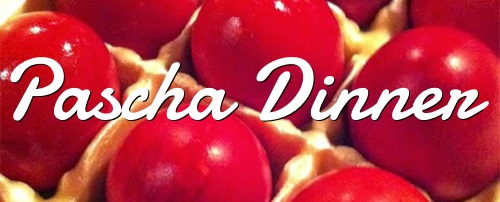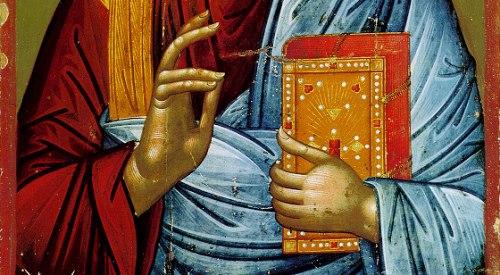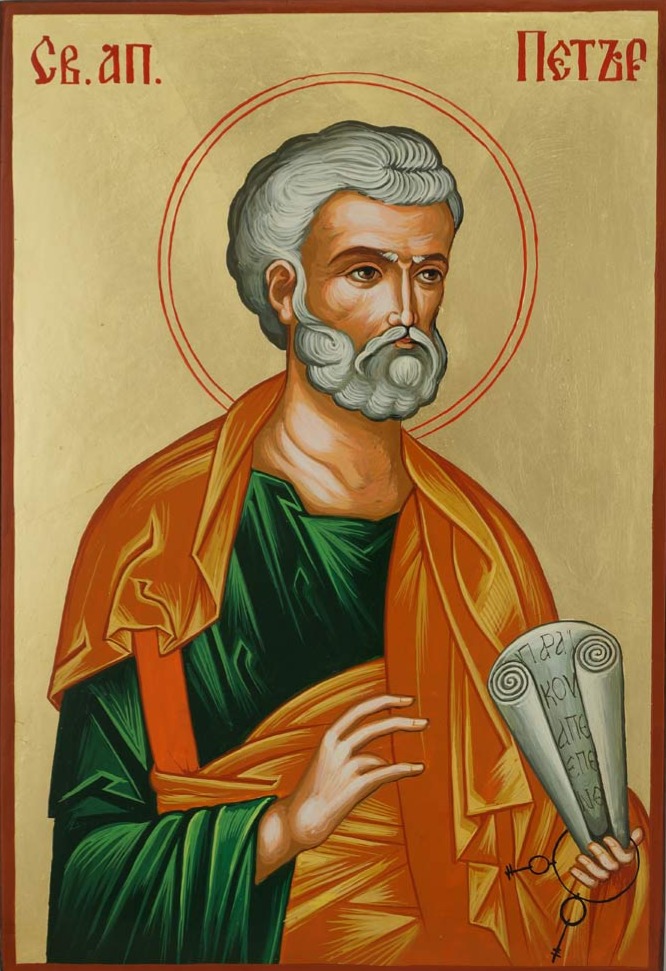Pascha (Passover)
The Resurrection of our Lord and Savior Jesus Christ

Pascha
Holy Week comes to an end at sunset of Great and Holy Saturday, as the Church prepares to celebrate her most ancient and preeminent festival, Pascha, the feast of feasts. The time of preparation will give way to a time of fulfillment. The glorious and resplendent light emanating from the empty Tomb will dispel the darkness. Christ, risen from the dead, cracks the fortress of death and takes “captivity captive” (Psalm 67:19). All the limitations of our createdness are torn asunder. Death is swallowed up in victory and life is liberated. “For as by a man came death, by a man came also the resurrection of the dead. For as in Adam all die, so also in Christ shall all be made alive” (I Corinthians 15:21-22). Pascha is the dawn of the new and unending day. The Resurrection constitutes the most radical and decisive deliverance of humankind.
[…]
The Resurrection has not yet abolished the reality of death. But it has revealed its powerlessness (Hebrews 2:14-15). We continue to die as a result of the Fall. Our bodies decay and fall away. “God allows death to exist but turns it against corruption and its cause, sin, and sets a boundary both to corruption and sin.” Thus, physical death does not destroy our life of communion with God. Rather, we move from death to life – from this fallen world to God’s reign.
Read more about Pascha on the Greek Orthodox Archdiocese website.
Agape Service and Pascha Dinner (Sunday April 8, 2017)

On Pascha Sunday we will come together for Agape Vespers (Sunday, April 8, 2017), at 11am.

Following the Agape Vespers on Sunday, April 8, plan on attending our church wide Pascha celebration. The menu includes lamb, potatoes, and other items. This is a wonderful way to share fellowship and bread to celebrate the resurrection of our Lord and Savior Jesus Christ. It was a huge success last year and will be a joy again this year. Please sign up with Thoma in the social hall after Liturgy if you plan to attend so we can prepare properly. Suggested donation is $15 per person with no cost for children.
There’s a place for you at the table!
Donations for Holy Week Flowers Needed

Flowers beautify the Church and are essential part of Orthodox worship during Holy Week and Pascha. Please give your donation for flowers to Angela Long who is overseeing this project this year.
Foreign Language Speakers…
We need foreign language speakers to read the Gospel in a language other than English for the Agape Vespers on Sunday, March 11, at 11:00am. This is the only day that laity read the Gospel and it represents the Gospel of Jesus going out into all the world after the Resurrection. Please sign your name and indicate your language on the sign-up sheet in the Social Hall bulletin board.
Readings are divided into three sections. If we have more people than languages (2 or 3 speaking the same language), we will assign separate sections to each speaker.
The passage to read will be John 20:19-25
Calendar At A Glance
Lenten Schedule
A complete schedule of Holy Week services is posted on the St. Peter website.
- PALM SUNDAY, April 1, 2018 — 9:30am Divine Liturgy Palm Sunday
- PALM SUNDAY, April 1, 2018 — 11:30am Palm Sunday Brunch
- PALM SUNDAY, April 1, 2018 — 6:30pm Bridegroom Service
- HOLY MONDAY, April 2, 2018 — 6:30pm Bridegroom Service
- HOLY TUESDAY, April 3, 2018 — 6:30pm Bridegroom Service
- HOLY WEDNESDAY, April 4, 2018 — 6:30pm Holy Unction
- HOLY THURSDAY, April 5, 2018 — 9:30am Liturgy of the Last Supper
- HOLY THURSDAY, April 5, 2018 — 6:30pm The Twelve Gospels
- HOLY FRIDAY, April 6, 2018 — 9:00am Royal Hours / Decoration of Tomb of Christ following
- HOLY FRIDAY, April 6, 2018 — 6:30pm Lamentations Service with Procession
- HOLY SATURDAY, April 7, 2018 — 9:30am First Resurrection Service
- HOLY SATURDAY, April 7, 2018 — 10:00pm GREAT AND HOLY PASCHA
- Saturday, April 7, 2018 — 11:00am Agape Vespers / Paschal Celebration in Social Hall following
Wisdom From The Elders
Kissing with the lips corresponds to kissing with the soul; and when we kiss holy things [icons, relics, the chalice], we ought to kiss them with the soul and heart as well as the lips. St. John of Kronstadt
If you are constantly angry and complaining, it is indicative of a proud soul. Humble yourself, reproach yourself, and the Lord is powerful to give you comfort and a helping hand. St. Anatoly of Optina
We must repent for our imperfections, for our state of being. Here it is important to make a distinction between repentance and contrition. Repentance refers more to a specific fault that we have committed, while contrition is a permanent state. Contrition needs to be the default state of our souls. Elder Sergei of Vanves
How can we overcome the sinfulness that is already firmly established within us? We must use force. St. John of Karpathos
Kissing with the lips corresponds to kissing with the soul; and when we kissholy things [icons, relics, the chalice], we ought to kiss them with the souland heart as well as the lips. St. John of Kronstadt
Remember in Your Prayers
Vassiliki
Octavio
Tom
Carl
Rena
Nikolay (5 year old boy in Bulgaria whose parents asked us to pray)
Jerry
Peter
David
Eva K.
Rosie
Jill
Connie
Sean Helgeland (great nephew to Steve and Anne Brietenbach)
Kathryn
Jeremy
Robert
Jane
Theodora
Baby Brynn L.
Micheal
Haralambos
Lillian
Presbytera Rosy
Valentina
John
Eva W.
Barbara
Angela
Sonya
Kenneth
Carol Ann
Matthew
Chrysostom
Tim
Ron
Ivy-Jean
Pat
Christina
Maria Louise
Maximos
Marian
Photini
Nicholas
Sarah
Petronia (Wife of Phil Pappas)
Constantine Houpis
Anna Marie Smith Baker
Ron Chromulak
Beverly Chromulak
Katerina
Loucine Kassis
Mary Kassis
Baby Maximus
Christine
Maria
Annette Star
Claire Livaditis
Eva Chandilles
Baby Dani
Scott Nedoff
Anthony Mourgis
John Hansen
James Hord
Tom
How should we pray for the sick? Remember them daily. Say their names (first names are sufficient) and ask God to bestow mercy and grace on them.
Add or remove names and print this list for easy reference during your prayer time on the St. Peter website.
Sunday Readings

Epistle
This is the day which the Lord hath made; let us rejoice and be glad therein!
O give thanks unto the Lord, for He is good; His mercy endureth forever.
The Reading from the Acts of the Apostles. (1:1-8)
In the first book, O Theophilus, I have dealt with all that Jesus began to do and teach, until
the day when He was taken up, after He had given commandment through the Holy Spirit to the Apostles whom He had chosen. To them He presented Himself alive after His passion by many proofs, appearing to them during forty days, and speaking of the kingdom of God. And while staying with them He charged them not to depart from Jerusalem, but to wait for the promise of the Father, which, He said, “You heard from Me; for John baptized with water, but before many days you shall be baptized with the Holy Spirit.” So when they had come together, they asked Him, “Lord, will you at this time restore the kingdom to Israel?” He said to them, “It is not for you to know times or seasons which the Father has fixed by His own authority. But you shall receive power when the Holy Spirit has come upon you; and you shall be my witnesses in Jerusalem and in all Judea and Samaria and to the end of the earth.”
Gospel
The Reading from the Holy Gospel according to St. John. (1:1-17)
In the beginning was the Word, and the Word was with God, and the Word was God. He was in the beginning with God; all things were made through Him, and without Him was not anything made that was made. In Him was life, and the life was the light of men. The light shines in the darkness, and the darkness has not overcome it. There was a man sent from God, whose name was John. He came for testimony, to bear witness to the light, that all might believe through him. He was not the light, but came to bear witness to the light. The true light that enlightens every man was coming into the world. He was in the world, and the world was made through Him, yet the world knew Him not. He came to His own home, and His own people received Him not.
But to all who received Him, who believed in His Name, He gave power to become children of God; who were born, not of blood, nor of the will of the flesh, nor of the will of man, but of God. And the Word became flesh and dwelt among us, full of grace and truth; we have beheld His glory, glory as of the only Son from the Father. (John bore witness to Him, and cried, “This was He of Whom I said, ‘He Who comes after me ranks before me, for He was before me.’”) And from His fullness have we all received, grace upon grace. For the law was given through Moses; grace and truth came through Jesus Christ.

